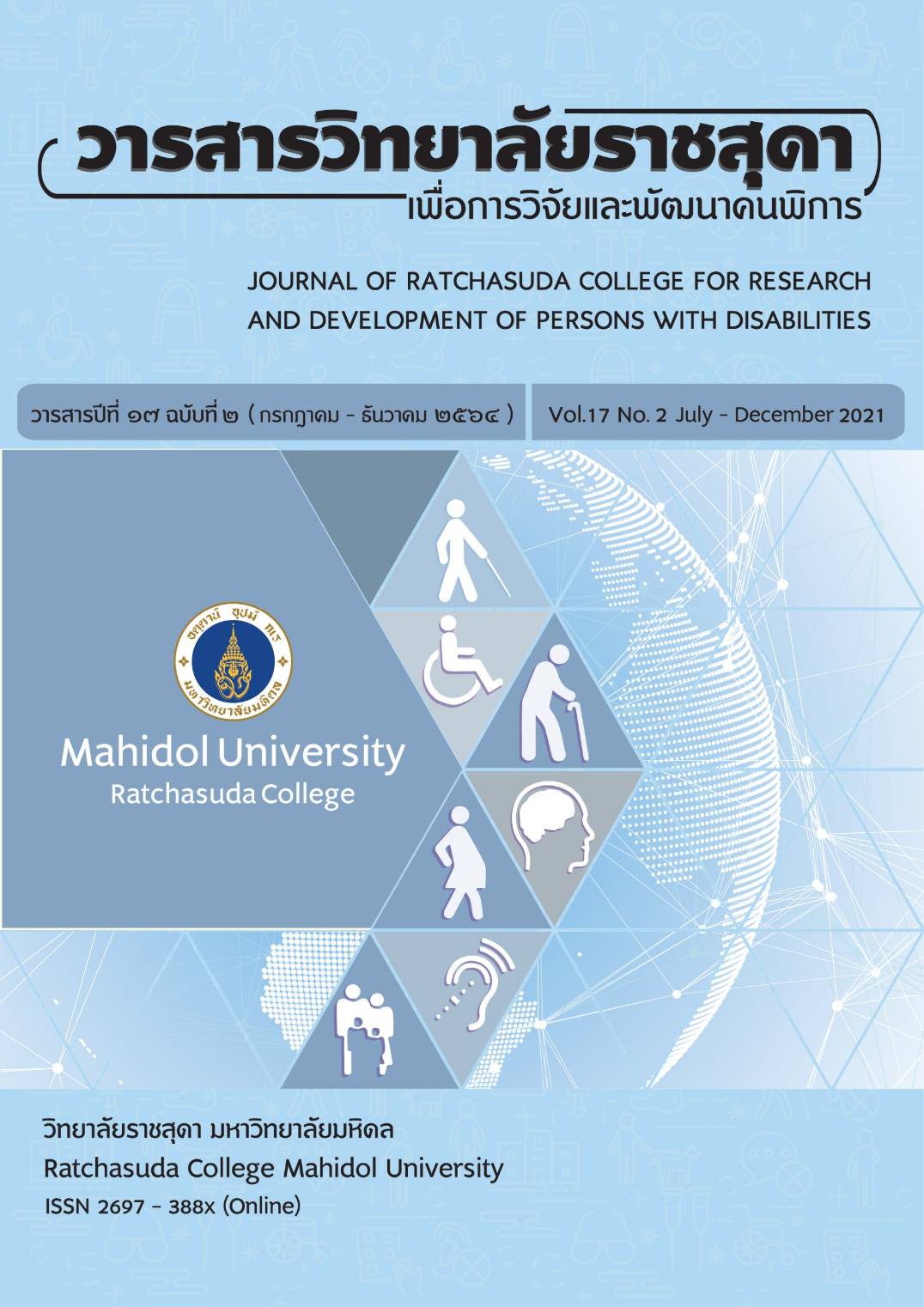The Participatory Care for People with autism using the Innovative Care for Chronic Condition framework, Hatyai, Songkhla
Keywords:
Autistic, The innovative care for chronic condition framework, The Participatory careAbstract
The aim of this descriptive research was to investigate participatory care for people with autism in Hatyai, Songkhla, using the Innovative Care for Chronic Condition framework. Informants were selected through purposive sampling and consisted of people with autism and their families, care providers, policy makers and community partners. Data were collected through in-depth interviews and group discussions and analyzed using content analysis and summarized according to the conceptual framework. The findings of the study were as follows: 1) Micro level: people with autism and their families are informed about the disease and how to deal with complications but not comprehensively, they are motivated by disease information showing positive improvement, perceive social obligations and religious beliefs. They are prepared for income through savings. The health, education, and social welfare team have clear plans for childhood and school age. The community networks recognize that there are people with autism in the area but, they are not prepared for the emotional coping skills. 2) Meso Level: There is a lack of collected and organized databases of organizations. For management within the community, there are model areas that promote education for people with autism and are supported by community leaders and school principals. 3) Macro Level: Policy integration, budget allocation and legal measures have been taken on the condition that people with autism are registered as disabled. Suggestions from this research: the system of care for people with autism should be adapted to ensure continuity throughout the life course, especially referrals and integrated databases. Education and awareness raising of the community living with people with autism should be a priority, as well as reviewing the injustice of the rights of people with disabilities.
Downloads
References
American Psychiatric Association. (2013). Diagnostic and statistical manual of mental disorders (5th. ed.) Arlington, VA: America Psychiatric Publishing.
Autistic Thai Foundation. (2010). The Situation of Autistic persons in Thailand 2010. Retrieved from http://oknation.nationtv.tv/blog/autisticthai/2010/06/04/entry-2
Centers for Disease Control and Prevention. (2018). Data and statistics on autism spectrum disorder. Retrieved from http://www.cdc.gov/ncbddd/autism/data.html
Chaiwatthanakunwanit, S. & Rukspollmuang, C. (2015). Alternative edicatopmal provision model to improve quality of life of children with special needs. Journal of Education Graduate Studies Research, 9(1), 192-201.
Chayathonthanawat, K. & Chatsuphang, P. (2015). Causal factors of buddhism and the contingency factors related with the parenting behavior in autistic children: A case study of Rajanukul Institute. Journal of Behavioral Science, 21(2), 21-38.
Department of empowerment of Persons with disabilities. (2017). The 5th national development plan for quality of life of persons with disabilities B.E. 2560 – 2564. Retrieved from http://web1.dep.go.th/?q=th/law/act./
Hawlader, M., Preity, S., Abdullah, A., Akhter, S., & Biswasa, A. (2018). Perceptions practices and challenges in schools for autistic children: A qualitative exploration of teachers and school authorities’s view in Bangladesh. Journal of Public health and Epidemiology, 5(1), 1-7.
Health Data Center. (2019). Percentage of autistic person access to service. Retrieved from https://hdcservice.moph.go.th/hdc/main/index.php
Jaitae, A. (2018). Potential performance for helping children with special needs based on household and community participation in the Saluang Subdistrict Administrative Organization Maerim District Chiangmai Province. Journal of Hatyai Academic, 16(2), 139-152.
Junsuwan, S., Kachai, S., Phothong, P. & Sanchalad, S. (2016). The need of autistic’s mother for helping support of children with autism. Journal of public Health Nursing, 30(3), 16-25.
Kittitharaphan, W. & Wattanasuksa, P. (2018). Years lived with disability from autism spectrum disorders in Thailand. Journal of Mental Health of Thailand, 26(1), 16-26.
Kunlaka, S. (2017). Caring for children with autism spectrum: A case study. Journal of Ramathibodi Nursing, 24(3), 227-238.
Manatae, P. (2013). The relationship between parent’s anxiety and autism adolescents rearing behavior (Master’s thesis). Srinakharinvirot University, Bangkok.
Munir, K., Lavelle, T., Helm, D., Thompson, D., Prestt, J. & Azeem, M. (2016). Autism: A global framework for action. Retrieved from http://www.wish.org.qa/wp/ content/uploads/2018/01/IMPJ4495_WISH_Autism_Report_WEB.pdf
Office of the Public Sector Development Commission. (2016). Model for improving the quality of public service: National Government Service Award 2016. Bangkok: Jasper print.
Pavasuthipaisit, C. et al., (2018). Situation of disability and access to essential public services of children with disabilities in the community of Thailand. Journal of health systems research, 12(3), 469-479.
Pongsaksri, M. (2012). The changes of families with autistic children in middle ages and families with autistic adolescents. Bulletin of SuanPrung, 28(1), 27-41.
Sanrattana, A., Chanpeng, P., Siriruk, P., & Pung, S. (2016). Current state, vocational needs of disabilities and case study of persons with autism. Journal of Ratchasuda College for Research and Development of Person with Disabilities, 12(5), 22-42.
Sriamnuay, R. (2018). The lived experiences of parents who raise children with autism
spectrum disorder: Implications for providing family-based early intervention. Journal of research and development in special education, 7(1), 82-103.
Srirath, J., Rodcumdee, B. & Suktrakul, S. (2018). Experiences of mothers of school-Age autistic children perceiving affiliate stigma. Journal of The Royal Thai Army Nurses, 19(2), 211-219.
Sunsern, R., Timsuwan, B. & Lawang, W. (2013). Developing disabled caregiving system based on families and communities. Journal of nursing and education, 6(3), 25-41.
Suppasri, J., Nukaew, O. & Suttharangsee, W. (2017). The effect of a family psychoeducation program for children with autism on the burden of caregivers: A preliminary study. The Southern College Network Journal of Nursing and Public Health, 4(special), 196-213.
Wanchaem, J., Sukarom, R. & Jarujittipan, P. (2010). Cost of autism rehabilitation at early intervention to primary school in Thailand. Journal of economics and public policy, 1(2), 85-100.
World Health Oraganization. (2002). Innovative care for chronic conditions: Building blocks for action: Global report. Retrieved from http://www/who.int/chp/knowledge/ publications/icccglobalreport.pdf
Downloads
Published
How to Cite
Issue
Section
License
บทความที่ได้รับการตีพิมพ์เป็นลิขสิทธิ์ของวารสารสถาบันราชสุดาเพื่อการวิจัยและพัฒนาคนพิการ






